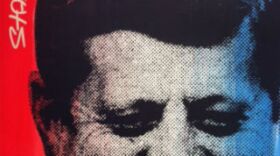Throughout November, KERA will mark the 50th anniversary of the John F. Kennedy assassination by taking a closer look at that fateful day, what it meant to the country, how it changed Dallas, and more.
Today, we look back at newspaper photographer Bob Jackson. As a photographer for the Dallas Times Herald, Jackson won a Pulitzer Prize for capturing on camera the killing of Lee Harvey Oswald.
On Friday, Jackson will join a panel of other photographers who have taken iconic pictures of tragic events. The event is from 12 to 1:30 p.m. at The Sixth Floor Museum at Dealey Plaza, 411 Elm St. in downtown Dallas.
Panelists also include John Moore of Getty Images, an Irving native who photographed the assassination of Benazir Bhutto, and Tom Franklin, who shot the iconic picture of firefighters raising the American flag at Ground Zero on 9/11. Kim Komenich, a former San Francisco Chronicle photographer, is the moderator. Tickets are available online.
The Sixth Floor Museum explores Jackson’s role capturing the events surrounding the Kennedy assassination:
As a member of the press corps, Jackson was at Love Field when the Kennedys arrived and rode in the presidential motorcade through downtown Dallas. When shots rang out in Dealey Plaza, Jackson was one of the few eyewitnesses to see a rifle in a sixth floor window of the Texas School Book Depository. His camera was empty of film at the time, and Jackson took no photos of the president's assassination. Two days later, waiting for police officers to transfer Lee Harvey Oswald to the county jail, Jackson took one of the most recognizable still images of the twentieth century when he photographed the moment Jack Ruby fatally shot Oswald. Jackson won the Pulitzer Prize for News Photography in 1964 for the iconic photograph.
And:
Jackson's most famous photograph is seared into the collective memory of the Kennedy assassination weekend. Yet, his other images from those dramatic four days provide a more complete portrait of the turmoil and emotion of those events. In 2008, while reflecting on his extraordinary career, Jackson said, "The Pulitzer Prize image will last a long time. I was just on a pretty routine assignment that turned into an historical event. I was just fortunate to be able to cover it. In the end, I want to be remembered not just for one picture, but for a career where I tried to do my best on any and every assignment."
In 2009, KERA's BJ Austin reported on Jackson's photo:
Jackson said the [Oswald] assignment was, in a way, routine that day. He was waiting for the police to walk the suspect out of headquarters. "You know, it was a simple shot," Jackson said. "But this one, of course, is one you don't want to miss. I was looking through the camera. I was pre-focused, a straight flash. And it just came together. I couldn't have planned it any better. If I had waited another second, Ruby would have been between me and Oswald. I don't even like to think what that would have been like. So, I guess it was meant to be."
A Photographer's Story: Bob Jackson and the Kennedy Assassination:
http://www.youtube.com/watch?v=VGzCNg1OEww
Living History with Bob Jackson:
http://www.youtube.com/watch?v=KTNXGT4leas
On Saturday, the Dallas Institute of Humanities and Culture will present a daylong symposium called "Understanding Tragedy: the Impact of the JFK Assassination on Dallas." National and local leaders and experts will come together to explore the topic with Dallas citizens from four perspectives: journalism, politics, art and the humanities, and religion. Purchase tickets here. KERA is one of the program partners.
KERA wants to hear your JFK stories and memories. Email us at jfk@kera.org. We may contact you or use your memory in an upcoming story.






